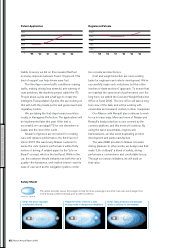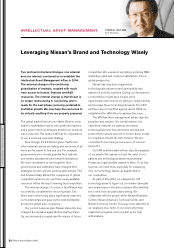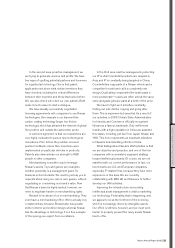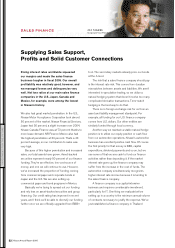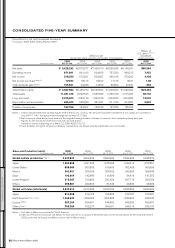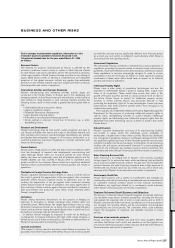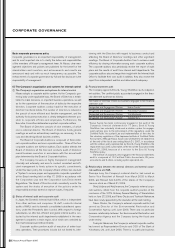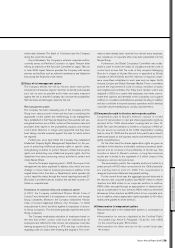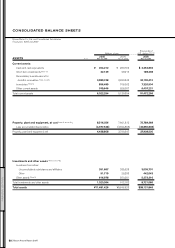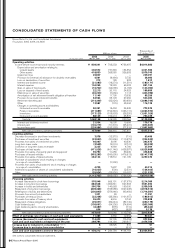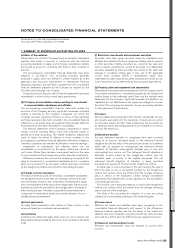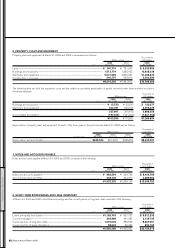Nissan 2006 Annual Report Download - page 60
Download and view the complete annual report
Please find page 60 of the 2006 Nissan annual report below. You can navigate through the pages in the report by either clicking on the pages listed below, or by using the keyword search tool below to find specific information within the annual report.
Basic corporate governance policy
Corporate governance is an important responsibility of management,
and its most important role is to clarify the duties and responsibilities
of the members of Nissan’s management team. At Nissan, clear man-
agement objectives and policies are published for the benefit of the
shareholders and investors, and achievements and results are
announced early and with as much transparency as possible. The
enhancement of corporate governance by full and fair disclosure is the
responsibility of management.
(1) The Company’s organization and systems for internal control
햲The Company’s organization and systems for internal control
Nissan adopts a corporate auditor system. As the Company’s gov-
erning body under applicable laws, the Board of Directors is estab-
lished to make decisions on important business operations, as well
as for the supervision of the execution of duties by the respective
directors. Corporate auditors conduct audit of the execution of
directors’ functional duties. The number of directors is reduced in
the pursuit of more efficient and flexible management, and the
authority for business execution is clearly delegated wherever pos-
sible to corporate officers and employees. Furthermore, the
Executive Committee deliberates important corporate matters.
The Board of Directors consists of nine members, of which
one is external director. The Board of Directors holds general
meetings as well as extraordinary meetings, as necessary, to dis-
cuss and decide significant business matters.
The Board of Corporate Auditors is composed of three exter-
nal corporate auditors and one corporate auditor. Three of the four
corporate auditors are full-time auditors. Each auditor attends the
Board of Directors all the time and conducts audit of Directors’
overall business execution in accordance with the annual audit
plan determined by the Board of Corporate Auditors.
The Company focuses on highly transparent management
internally and externally, and aims to conduct consistent and effi-
cient management to firmly achieve its specific commitments.
Under this basic policy, the Company’s Board of Directors resolved
a “System to ensure proper and appropriate corporate operations”
at the Board meeting held on May 17, 2006 in accordance with
the Corporation Law and the Corporation Law Enforcement
Regulations. The Board of Directors shall consistently monitor the
system and the status of execution of the policies under its
responsibility and also amend or improve issues, if required.
햳Status of internal audit and corporate audit
In Japan, the Domestic Internal Audit Office, which is independent
from other sections and comprises 14 staff, conducts internal
audits of NML’s and its domestic consolidated subsidiaries’ opera-
tions, under the President’s direct control. With respect to foreign
subsidiaries, an effective, efficient and global internal audit is con-
ducted by the internal audit departments established in the man-
agement companies in each region, all of which are controlled by
the Chief Internal Audit Officer (CIAO).
Corporate auditors perform audit of execution of entire busi-
ness operations. Their procedures include, but not limited to, inter-
viewing with the Directors with regard to business conduct and
attending the Board of Directors’ meetings and other significant
meetings. The Board of Corporate Auditors tries to enhance audit
efficiency by sharing information among each corporate auditors.
The corporate auditors also periodically receive the report of audit
plans and the results of audit from internal audit departments. The
corporate auditors also exchange their insight with the Internal Audit
Office to facilitate their own audit. In addition, they also receive the
report from independent auditors and determine its adequacy.
햴Financial statement audit
The Company appoints Ernst & Young ShinNihon as its independ-
ent auditors. The certified public accountants engaged in the finan-
cial statement audits are as follows:
The name of Certified Public Accountants engaged in the financial
statement audit
Designated and Engagement Partner Kazuo Suzuki*
Designated and Engagement Partner Yasunobu Furukawa
Designated and Engagement Partner Yoji Murohashi
Designated and Engagement Partner Takeshi Hori
* Kazuo Suzuki has been continuously engaged in the audit of the
Company’s financial statements for 17 years. Ernst & Young
ShinNihon has voluntarily introduced a rotation system for engage-
ment partners prior to the enforcement of the regulations under the
Certified Public Accountant Law and implementation of the rules for
the voluntary regulations of the Japanese Institute of Certified Public
Accountants. Although Kazuo Suzuki was scheduled to be replaced as
of the end of the fiscal year ending March 31, 2007, in accordance
with the rotation policy implemented by Ernst & Young ShinNihon, the
replacement occurred a year earlier, at the end of the fiscal year ended
March 31, 2006, because of a revision to the Ernst & Young
ShinNihon policy.
The member of assistants who engaged in the financial statements
audit is composed of 15 Certified Public Accountants, 25 junior
accountants, and 6 others, including system specialists, etc.
햵Relationships between the external directors and external corpo-
rate auditors and NML
Shemaya Levy, the Company’s external director, had served as
Senior Vice President of Renault from March 2002 to March
2004, and Renault held 44.3% of the shares of the Company’s
common stock as of March 31, 2006.
Shinji Ichijima and Keiji Imamura, the Company’s external corpo-
rate auditors, retired from the corporate auditor’s position at the
conclusion of the 107th Ordinary General Meeting of Shareholders
held on June 27, 2006, and Takeo Otsubo and Toshiyuki Nakamura
have been newly appointed by the resolution at the said meeting.
Takeo Otsubo, the Company’s external corporate auditor, had
served as Director of the Environmental Restoration and
Conservation Agency until June 2006. There was no particular
business relationship between the Environmental Restoration and
Conservation Agency and the Company during the fiscal year
under review.
Toshiyuki Nakamura, the Company’s external corporate auditor,
had served as Representative Director and COO of The Bank of
Yokohama, Ltd. until June 2006. There is no particular business
CORPORATE GOVERNANCE
Nissan Annual Report 2005
58
FINANCIAL SECTION


